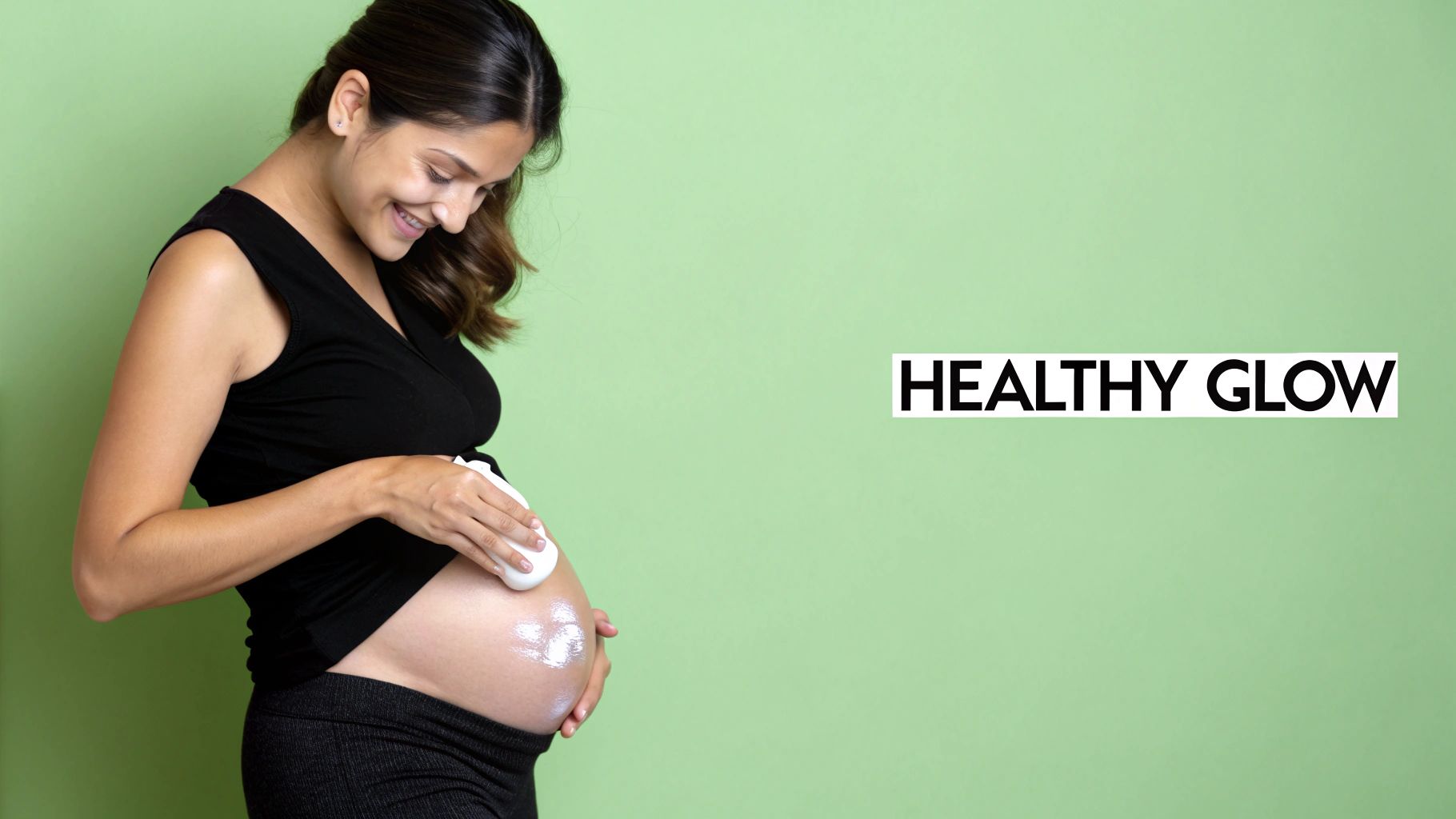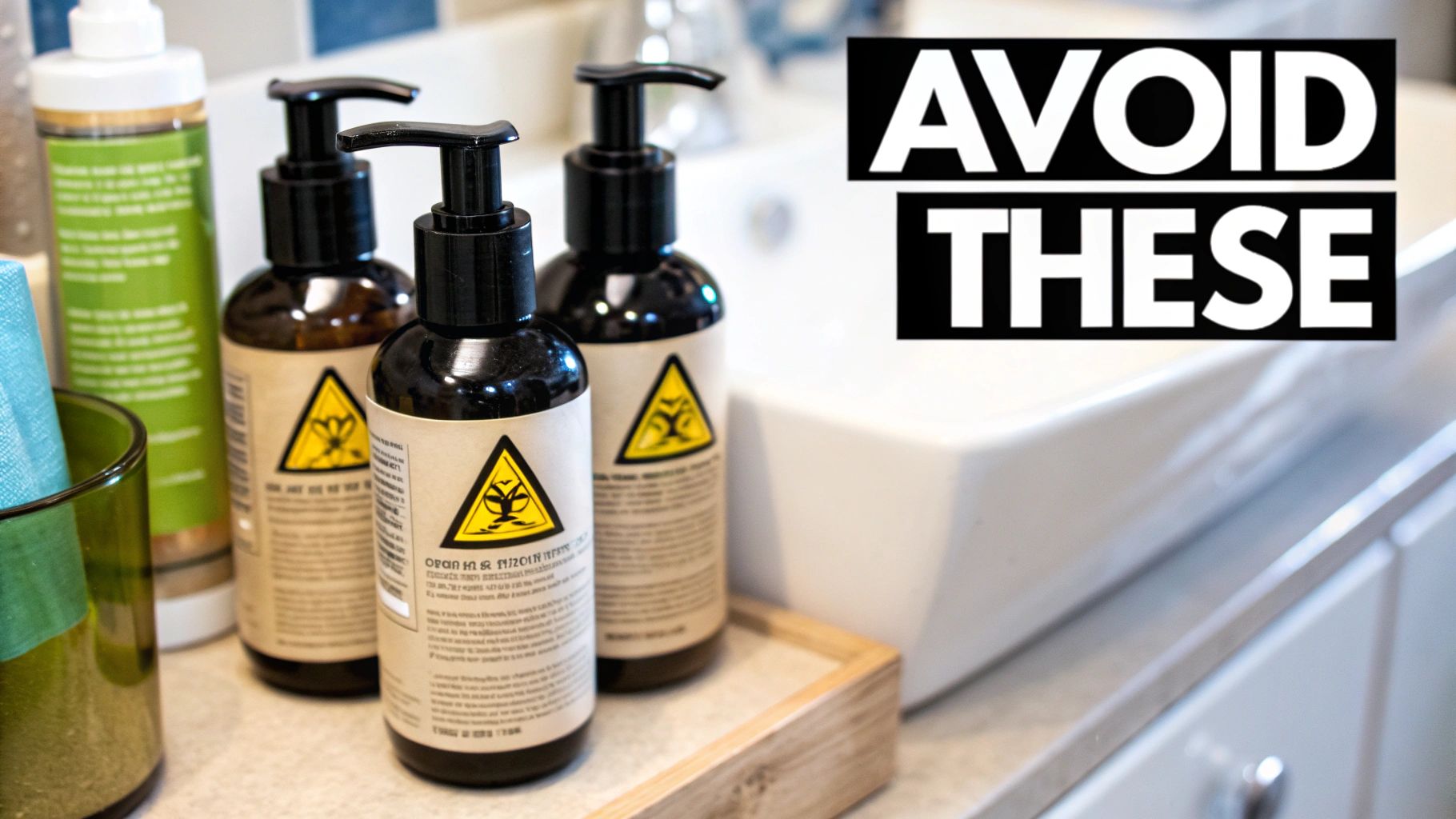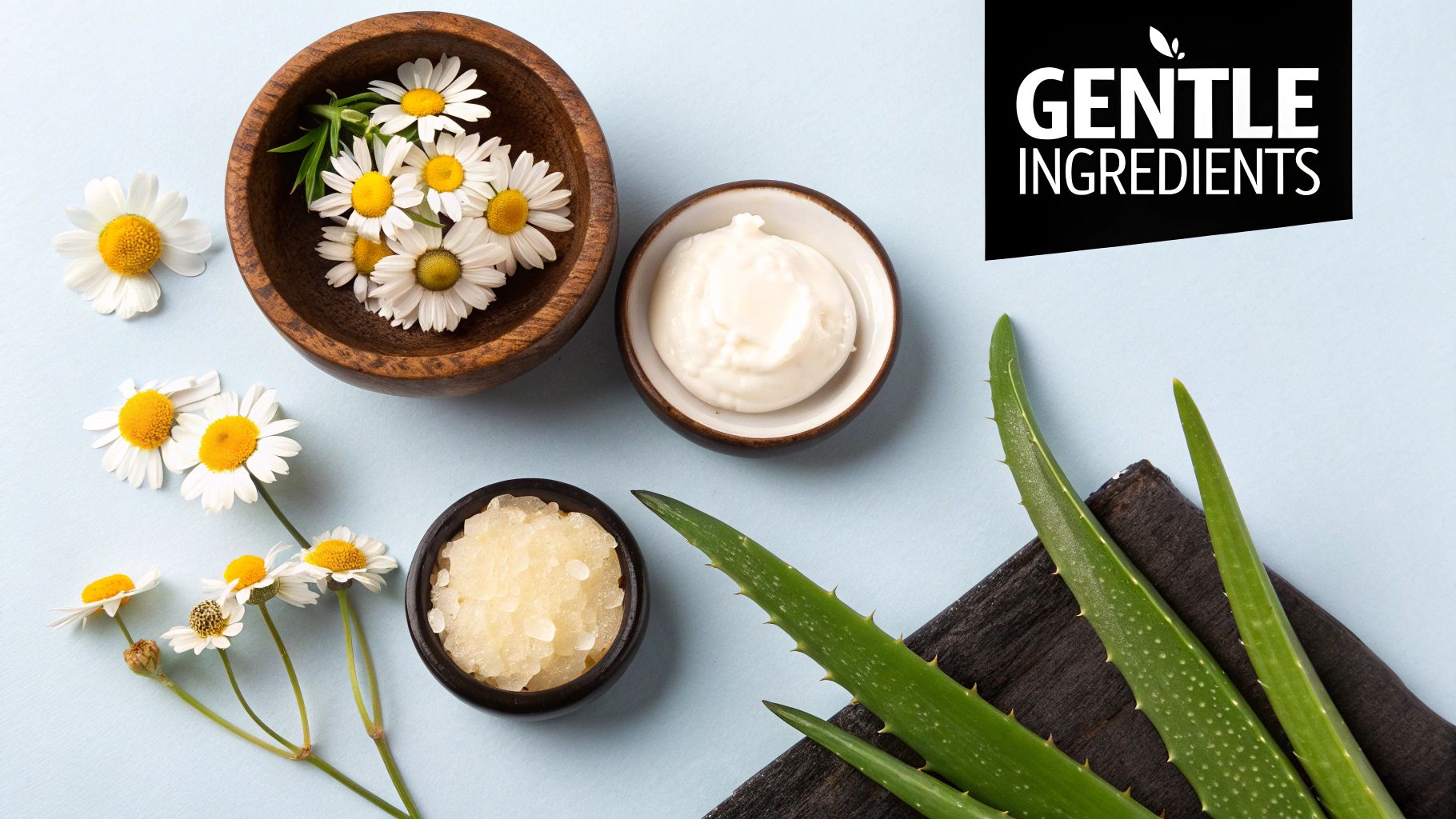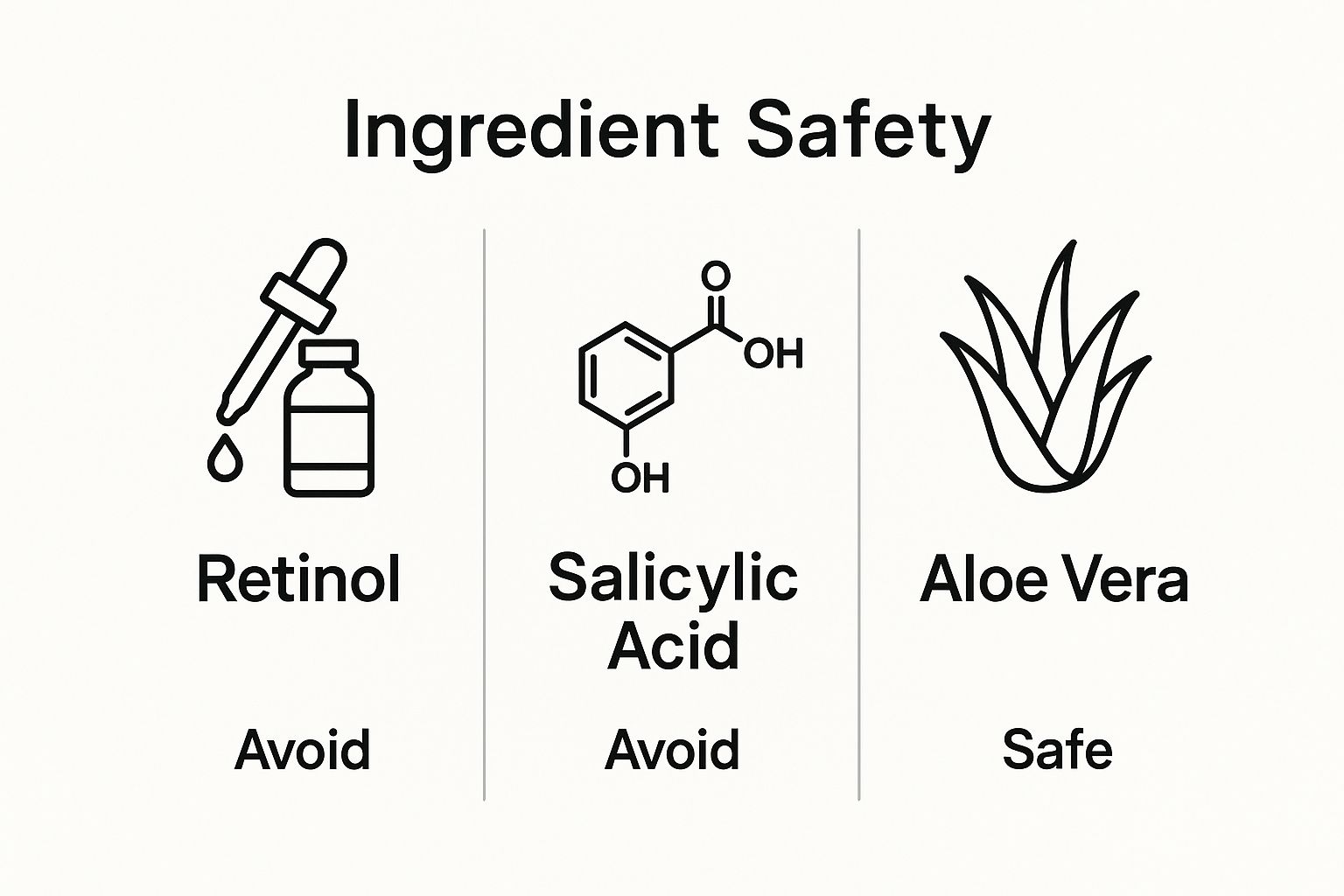
Your Guide to Pregnancy Safe Skincare
Here's the simple truth about pregnancy-safe skincare: it’s not about giving up your entire routine. It's about being more mindful and swapping out a few key ingredients to keep both you and your growing baby safe and healthy. Think of it as putting a protective, nurturing filter on your existing habits for total peace of mind.
Navigating Your Skincare Journey During Pregnancy

When you're expecting, your entire world shifts—and your daily skincare routine is a small but important part of that. This isn't about restriction; it's an opportunity to simplify, nurture your skin, and really tune into what it needs right now. The main goal is simply to make smart, safe swaps to handle the new skin changes that pregnancy hormones can bring.
Why Your Routine Needs a Refresh
Your body does incredible things during pregnancy, and your skin is often front and center for the show. That famous "pregnancy glow" is real, thanks to increased blood flow, but those same hormonal shifts can also bring on some less-than-welcome surprises.
You might start noticing things like:
- Hormonal Acne: Breakouts popping up along your jawline and cheeks are incredibly common, even for women who've always had clear skin.
- Increased Dryness or Oiliness: Your skin type can do a complete 180, suddenly feeling tight and parched or slick and oily.
- Hyperpigmentation (Melasma): Sometimes called the "mask of pregnancy," this causes dark, patchy spots to appear on the forehead, cheeks, and above the lip.
- Heightened Sensitivity: Don't be surprised if your go-to moisturizer suddenly makes your skin red or irritated. Your skin is just more reactive right now.
To get a clearer picture, here’s a quick breakdown of the most common issues women face during pregnancy and the best ways to tackle them safely.
Quick Guide to Common Pregnancy Skin Changes
| Common Skin Concern | Why It Happens | Safe Solutions to Try |
|---|---|---|
| Acne & Breakouts | Surges in androgen hormones increase oil production, clogging pores. | Azelaic acid, glycolic acid (in low concentrations), sulfur-based spot treatments. |
| Dryness & Dehydration | Hormonal changes can compromise the skin’s moisture barrier. | Hyaluronic acid, ceramides, glycerin, squalane, and gentle, fragrance-free moisturizers. |
| Melasma (Dark Patches) | Estrogen and progesterone stimulate excess melanin production when exposed to sun. | Vitamin C, niacinamide, azelaic acid, and most importantly, daily broad-spectrum SPF 30+. |
| Redness & Sensitivity | Increased blood flow and a more reactive immune system make skin easily irritated. | Soothing ingredients like oat extract, centella asiatica (cica), and aloe vera. |
This table is just a starting point, but it shows that for every new skin challenge, there’s a gentle and effective ingredient waiting to help.
The Rise of Conscious Skincare Choices
If you're starting to read labels more closely, you're in good company. The demand for pregnancy-safe skincare has exploded as more women become educated about what they're putting on their bodies.
The global pregnancy-safe skincare market is projected to be worth approximately $2.5 billion in 2025 and is expected to grow to $4.2 billion by 2033. This incredible growth is largely thanks to women actively seeking alternatives to ingredients like retinoids.
This isn't just a trend; it's a movement that empowers expecting mothers to find products that actually work without causing worry. You can confidently manage things like hormonal acne or melasma with ingredients that are scientifically proven to be safe and effective during this special time.
Ultimately, building a pregnancy-safe skincare routine is about feeling good in your skin. It’s about knowing you’re nurturing yourself while protecting your baby's well-being. If you'd like to dive deeper, you can explore detailed insights about pregnancy skincare trends to understand the market better.
The Skincare Ingredients to Pause During Pregnancy

Think of your skin like a very effective, but not perfect, barrier. It does a fantastic job of keeping things out, but some potent ingredients can still make their way into your bloodstream. During pregnancy, it just makes sense to be a little more cautious about what your skin is soaking up. That's why a core part of any pregnancy safe skincare guide is knowing which products to set aside for a while.
This isn’t about causing alarm. It’s about feeling empowered. Instead of just giving you a "do not use" list, I want to explain the why behind the recommendations. When you understand the reasoning, you can scan an ingredients label with confidence and build a routine that keeps both you and your baby in mind.
The Major Players to Avoid
When you talk to doctors and dermatologists, a few ingredients consistently come up as ones to bench during pregnancy. These are the heavy hitters—the powerhouse actives that, while incredibly effective, carry potential risks during this unique time.
Retinoids (All Forms) This one is non-negotiable. If there's one ingredient to stop using immediately, it's this one. Retinoids are a family of Vitamin A derivatives that are absolute superstars for tackling wrinkles and acne. The problem? High doses of Vitamin A have been directly linked to birth defects.
- What to Look For: Retinol, Tretinoin (Retin-A), Adapalene (Differin), Tazarotene, Retinyl Palmitate, and Retinaldehyde.
- A Simple Analogy: Imagine retinoids are like a foreman on a construction site, yelling at your skin cells to work faster and turn over at a dramatic pace. That’s great for a smooth complexion, but it's a powerful directive you don't want your developing baby to overhear.
- The Bottom Line: To be completely safe, all topical retinoids should be put on hold from the moment you start trying to conceive until after you've finished breastfeeding.
High-Dose Salicylic Acid Salicylic acid, a beta-hydroxy acid (BHA), is a go-to for clearing out pores and fighting acne. Here's the good news: low-concentration products (under 2%) found in a daily face wash or a spot treatment are generally considered safe.
The concern lies with high-dose preparations, like professional-grade chemical peels or potent leave-on serums. Because salicylic acid is related to aspirin, the worry is that high concentrations could be absorbed and pose a risk.
When building a pregnancy safe skincare plan, it’s always better to be cautious. You can easily swap a high-strength BHA for a gentler acid, like azelaic or glycolic acid. You'll get the peace of mind you need without having to give up on treating breakouts.
Other Ingredients Worth a Second Look
Beyond the main two, a few other ingredients often come up in conversation. Let's clear up the confusion so you know exactly how to approach them.
Hydroquinone This is a powerful skin-lightening agent prescribed for significant hyperpigmentation like melasma (the "mask of pregnancy"). However, the body can absorb a surprisingly high amount of it—some studies suggest up to 35-45%. With such a high absorption rate and a lack of solid safety data for pregnancy, this is one to skip.
Certain Chemical Sunscreens Okay, this is where it can get tricky. The main ingredient of concern here is Oxybenzone. Some studies have pointed to its potential to act as a hormone disruptor, and we know it's absorbed into the body more readily than other filters. While the jury is still out, why take the chance?
- The Safe Swap: This one is easy. Mineral sunscreens are the undisputed champions of pregnancy-safe sun protection. Formulas with Zinc Oxide and Titanium Dioxide create a physical shield that sits on top of your skin instead of being absorbed. They are incredibly safe, highly effective, and the best choice you can make.
Some Essential Oils While a drop of lavender oil in a diffuser is fine, using concentrated essential oils directly on the skin is a different story. Some oils, like clary sage, jasmine, and rosemary, are thought to have the potential to stimulate uterine contractions. It's best to stick to products from trusted brands that have been specifically formulated with pregnancy in mind.
Ultimately, your journey to a pregnancy-safe routine is about making smart, informed choices. By learning to spot these key ingredients, you can easily edit your shelf to create a collection of products that feels both indulgent and completely secure. It’s a simple act of self-care that provides invaluable peace of mind.
Safe and Effective Ingredients to Embrace

Now that we’ve talked about what to set aside for a while, let's dive into the good stuff—all the wonderful ingredients you can use. Building a pregnancy-safe skincare routine isn't about feeling restricted. It's about discovering gentle, powerful allies that will help your skin truly thrive. Think of it as upgrading your glow-boosting toolkit.
Hormonal shifts can throw your skin for a loop, bringing on everything from sensitivity and dryness to acne and dark spots like melasma. The right ingredients can help you navigate these changes beautifully.
Let's walk through some of the best ingredients to welcome into your daily regimen.
The Hydration Hero: Hyaluronic Acid
If your skin suddenly feels tight, thirsty, and flaky, Hyaluronic Acid (HA) is your new best friend. This ingredient is a moisture magnet, with the incredible ability to hold up to 1,000 times its weight in water.
Think of it as a tiny, super-absorbent sponge for your skin cells. When you apply it, it pulls moisture from the air and deeper skin layers, plumping everything up from the inside out. The result? Instant relief from that dreaded tightness and a dewy, comfortable complexion. Because HA is something our bodies naturally produce, it's exceptionally safe and well-tolerated during pregnancy.
The Brightening Protector: Vitamin C
Vitamin C is a true antioxidant powerhouse and a celebrated hero in pregnancy skincare. It’s especially brilliant at tackling one of pregnancy’s most common skin complaints: melasma, often called the "mask of pregnancy."
By acting as a shield against environmental stressors and gently slowing down the enzyme that creates dark spots, Vitamin C helps both prevent and fade hyperpigmentation. It’s your best bet for keeping a bright, even complexion without turning to harsher chemicals.
For the best results, I always recommend using a Vitamin C serum in the morning. This lets it work with your sunscreen, giving you an extra layer of defense against UV damage all day long.
The Acne and Redness Soother: Azelaic Acid
When hormonal acne makes an unwelcome appearance, it’s easy to miss heavy-hitters like retinoids. But don't worry—Azelaic Acid is a fantastic and safe alternative that does more than just one job.
Here’s how it works its magic:
- Fights Bacteria: It helps clear out the specific bacteria that cause breakouts.
- Reduces Inflammation: It calms the redness and irritation that make pimples look so angry.
- Encourages Cell Turnover: It gently exfoliates, which is key to keeping pores from getting clogged in the first place.
What makes Azelaic Acid a real star is its talent for fading post-inflammatory hyperpigmentation—those stubborn dark marks left behind after a blemish heals. It’s a multitasking ingredient that helps skin stay clear and even-toned. For an extra boost, you can always explore a professional pregnancy-safe facial, which often features gentle but effective ingredients like this.
The Ultimate Sun Protectors: Mineral Sunscreens
If there's one non-negotiable step in any skincare routine, it's daily sun protection. This becomes even more critical during pregnancy when your skin is extra susceptible to sun-induced pigmentation. In this department, mineral sunscreens are the undisputed champions.
The two ingredients you want to see on the label are Zinc Oxide and Titanium Dioxide. They work by sitting on top of your skin to form a physical shield, rather than being absorbed.
| Ingredient | How It Works | Key Benefit for Pregnancy |
|---|---|---|
| Zinc Oxide | Forms a physical barrier that reflects and scatters both UVA and UVB rays. | Offers broad-spectrum protection and has amazing soothing properties, which is a huge plus for sensitive skin. |
| Titanium Dioxide | Also creates a physical barrier, primarily protecting against UVB and short-wave UVA rays. | Known for being extremely gentle and non-irritating, making it perfect for the heightened sensitivity of pregnancy. |
Unlike chemical sunscreens, these minerals don’t sink into your skin, making them the safest and most reliable choice for protecting both you and your baby. By embracing these nurturing ingredients, you can confidently build a routine that leaves you with healthy, glowing skin throughout your entire pregnancy.
Your Trimester-by-Trimester Skincare Blueprint
Navigating skincare during pregnancy can feel like trying to hit a moving target. The routine that made your skin happy last month might suddenly cause issues, and that’s completely normal. Each trimester ushers in a new wave of hormonal changes, and your pregnancy-safe skincare plan needs to be flexible enough to roll with them.
Think of this less as a strict set of rules and more as a responsive roadmap. We’ll walk through each stage, giving you a clear blueprint to keep your skin feeling balanced and looking radiant from that first positive test all the way to the final countdown.
The First Trimester Focus
The first trimester can be a wild ride for your skin. Your body is in overdrive, and for many of us, that means more oil, surprise breakouts, and a newfound sensitivity to products you’ve used for years. The name of the game right now is simplicity and gentleness.
This is the perfect time to strip your routine back to the absolute essentials:
- Gentle Cleanser: Put aside any harsh, stripping cleansers. Instead, reach for a milky, cream, or gentle gel wash that won’t compromise your skin’s natural protective barrier.
- Hydrating Serum: A straightforward hyaluronic acid serum is your best friend here. It provides a serious dose of moisture without any irritating extras.
- Soothing Moisturizer: Look for fragrance-free creams with calming ingredients like ceramides or oat extract to help dial down any redness.
- Mineral Sunscreen: This one is non-negotiable. A daily SPF of 30+ is your number one defense against melasma (the “mask of pregnancy”), which can start to develop now.
This pared-back, foundational routine helps stabilize your skin and dramatically lowers the risk of irritation when it’s at its most reactive.
Ingredients to Embrace vs. Ingredients to Pause
When you start reading labels, it's easy to get overwhelmed. To simplify things, here's a quick cheat sheet that breaks down which ingredients are generally considered good to go and which ones you should put on hold until after the baby arrives.
| Ingredient Category | Safe to Use (Embrace) | Best to Avoid (Pause) |
|---|---|---|
| Exfoliants | Glycolic Acid (low %), Lactic Acid, Azelaic Acid | Retinoids (Retin-A, Tretinoin), High-Dose Salicylic Acid |
| Antioxidants | Vitamin C, Vitamin E, Niacinamide | Hydroquinone |
| Hydrators | Hyaluronic Acid, Glycerin, Squalane | Formaldehyde-releasing preservatives |
| Sunscreens | Mineral-based (Zinc Oxide, Titanium Dioxide) | Chemical-based (Oxybenzone, Avobenzone) - Consult your doctor |
This table is a great starting point for making informed choices. When in doubt, a quick chat with your dermatologist or OB-GYN can clear up any confusion.

The Second Trimester Glow Up
For many women, the second trimester is the honeymoon phase of pregnancy. Morning sickness often fades, energy levels bounce back, and that legendary "pregnancy glow" might just make an appearance. The flip side? This is also when pigmentation issues like melasma can become more noticeable, thanks to a surge in estrogen.
Your mission now is to maintain that happy balance while gently and safely addressing any discoloration. This is where you can start to re-introduce a safe active ingredient into your routine.
Expert Tip: Vitamin C is the perfect addition for the second trimester. When you apply a good Vitamin C serum in the morning—right before your moisturizer and sunscreen—it works as a potent antioxidant. It helps fend off environmental damage and, crucially, can help inhibit the enzyme responsible for creating those dark spots.
Sample Morning Routine (2nd Trimester):
- Gentle Cleanser
- Vitamin C Serum
- Hydrating Moisturizer
- Mineral Sunscreen (SPF 30+)
The Third Trimester Hydration Push
You’re in the final stretch! Your body is channeling an incredible amount of resources toward the baby, and your skin is stretching to its absolute limit, especially on your belly, hips, and chest. The skincare focus for this last trimester is all about deep, intensive hydration and supporting your skin's elasticity.
It’s time to bring in the heavy hitters: richer creams, nourishing butters, and luxurious oils. Look for ingredients like shea butter, cocoa butter, squalane, and jojoba oil. They are phenomenal for sealing in moisture, soothing that maddening itchiness, and keeping your skin as supple as possible. While stretch marks are largely determined by genetics, keeping your skin deeply moisturized can certainly help with its resilience and overall comfort.
To see how all these pieces come together, you can find a complete guide in our post on building a full pregnancy skincare routine.
Sample Evening Routine (3rd Trimester):
- Creamy Cleanser
- Hyaluronic Acid Serum
- Rich, Nourishing Moisturizer or Body Butter
- Targeted body oil on belly, hips, and thighs
By thoughtfully adjusting your approach for each trimester's unique demands, you can confidently support your skin through every incredible change.
Of course. Here is the rewritten section, designed to sound completely human-written and natural.
How to Safely Treat Common Pregnancy Skin Concerns
Pregnancy can throw your skin for a loop. One day it’s clear, the next you’re dealing with hormonal breakouts or stubborn dark spots. And while your go-to products might now be on the "off-limits" list, you are far from powerless. You just need to switch up your strategy.
Think of it like tending to a garden that suddenly has new, more sensitive needs. You wouldn’t stop watering it; you’d just find the right kind of plant food. It’s the same with your skin—this is about precision and care, not deprivation.
Managing Hormonal Acne and Breakouts
If your jawline and cheeks have suddenly become a hotspot for pimples, you're in good company. Surging androgen hormones can kick your oil production into overdrive, leading to clogged pores and angry, red blemishes. While retinoids and high-strength salicylic acid are off the table, there are some fantastic alternatives that can safely get things under control.
Azelaic acid is a true champion for pregnancy acne. It’s a multitasker that works by:
- Calming inflammation to take the heat out of red, painful pimples.
- Fighting acne-causing bacteria right at the source.
- Gently exfoliating to keep pores from getting congested in the first place.
Another great option is a low-strength glycolic acid (an AHA). When used in concentrations under 10%, it helps dissolve the “glue” that holds dead skin cells together, preventing them from clogging your pores. I’ve seen many clients have great success by adding a gentle glycolic acid toner or serum into their routine just a few times a week.
For those dealing with really persistent blemishes, our detailed guide has even more tips. You can learn how to build an effective pregnancy-safe acne treatment plan that’s right for you.
Fading Hyperpigmentation and Melasma
Ever heard of the "mask of pregnancy"? That patchy discoloration that can pop up on your forehead, cheeks, and upper lip has a name: melasma. It’s caused by a surge in hormones that rev up your pigment-producing cells, which are then triggered by sun exposure. Your best line of defense is a non-negotiable daily sunscreen habit, but you can also safely work on fading any spots that have already appeared.
Vitamin C is your best friend here. It’s a powerful antioxidant that not only shields your skin from environmental triggers but also helps block the enzyme responsible for creating that excess pigment. A Vitamin C serum every morning is a brilliant preventative and corrective step.
Niacinamide (Vitamin B3) is another fantastic ingredient for tackling uneven skin tone. It works by stopping pigment from transferring between skin cells, which helps fade the appearance of dark spots. As a bonus, it’s incredibly soothing and strengthens your skin barrier—a perfect match for sensitive pregnancy skin.
Minimizing and Soothing Stretch Marks
As your body beautifully makes room for your growing baby, the skin on your belly, hips, and thighs has to do a lot of stretching. Stretch marks, or striae, are essentially tiny tears in the skin's supportive dermal layer. While genetics play the biggest role in whether you get them, you can absolutely do things to support your skin's health and elasticity.
Keeping your skin deeply hydrated is crucial. This improves its pliability and can help with that intense itching that often comes with a growing belly. Look for products loaded with nourishing, safe ingredients.
| Safe Ingredient | How It Helps | Why It's Great for Pregnancy |
|---|---|---|
| Centella Asiatica (Cica) | A plant extract known for boosting collagen and calming inflammation, helping the skin repair itself. | Its powerful soothing properties are a lifesaver for irritated skin. |
| Shea & Cocoa Butters | Packed with fatty acids, these rich butters create a protective seal to lock in moisture. | They provide deep, lasting hydration to keep skin supple. |
| Hyaluronic Acid | This powerhouse humectant pulls moisture into the skin, plumping it up from within. | It’s incredibly gentle and gives you that hydrated feel without grease. |
Don't underestimate the power of massage, either. The simple act of massaging these creams and oils into your skin helps boost circulation, which can further support your skin’s health. By taking these targeted steps, you can confidently handle whatever your skin throws at you and keep it feeling healthy and radiant throughout this amazing journey.
It’s easy to pour all your energy into finding the perfect pregnancy-safe routine for your face, but what about the skin on the rest of your body? From your shoulders to your toes, your skin is going through its own incredible journey, stretching and adapting as your baby grows. It deserves just as much love and attention.
Taking care of your body isn’t just about pampering—it’s about making sure you feel comfortable in your own skin. This is the time to tackle common pregnancy woes, like that intense belly itch or sudden dryness, head-on. A little extra care supports your skin's health and elasticity when it’s working its hardest.
Soothing Stretch Marks and Itchy Skin
As your bump, hips, and thighs expand, your skin can start to feel tight, dry, and sometimes, incredibly itchy. This is your cue to bring in the heavy hitters: rich, nourishing body products that feel like a supportive hug for your skin.
When you're scanning labels, look for ingredients that deliver deep, lasting moisture and help keep your skin feeling supple:
- Shea Butter and Cocoa Butter: These are the classics for a reason. They're powerhouse emollients loaded with fatty acids that form a protective seal on your skin, locking in moisture for hours.
- Nourishing Oils: Think jojoba, almond, and coconut oils. They are fantastic for sealing in hydration right after a shower and really help improve your skin's flexibility.
- Hyaluronic Acid: Yep, it’s not just for your face! A body lotion with hyaluronic acid is a game-changer for drawing moisture into the skin, offering major relief from dryness and that taut feeling.
Making a daily ritual of massaging these products in not only feels amazing but also helps boost circulation. While we know stretch marks are largely determined by genetics, keeping your skin deeply moisturized is the absolute best thing you can do to support its resilience and calm any discomfort.
The global market for pregnancy and baby skincare was valued at about $6.5 billion in 2020 and is expected to more than double by 2031. This boom is a clear sign that mothers are seeking out safe, effective products. Natural stretch mark oils and butters that offer serious, long-lasting moisture are driving a huge part of this growth. You can explore the research on this expanding market to learn more.
Don't Forget Your Shower Routine and Vein Care
Finally, let's talk about the shower. Those harsh, stripping body washes you might have used before? They can make pregnancy-related sensitivity and dryness even worse. Now's the time to switch to a gentle, fragrance-free, or sulfate-free cleanser that won't mess with your skin's natural moisture barrier.
And if you're dealing with issues like varicose veins, which often pop up due to increased pressure, simple habits like gentle daily walks and elevating your legs can do wonders for circulation. It’s this kind of head-to-toe care that will help you feel your absolute best during this amazing time.
Your Pregnancy Skincare Questions, Answered
Feeling a little lost trying to figure out what’s safe for your skin during pregnancy? You’re not alone. It can feel like there are a million new rules to learn, but it doesn't have to be so complicated. Once you get the basics down, you’ll feel much more confident.
Let’s clear up some of the most common questions I hear from expecting moms.
Is Vitamin C Serum Safe to Use During Pregnancy?
Yes, it absolutely is! Not only is topical Vitamin C safe, but I often recommend it as a go-to ingredient during pregnancy. It’s a fantastic antioxidant that shields your skin from daily environmental stressors.
Even better, it's a brilliant way to tackle common pregnancy skin concerns like hyperpigmentation and melasma (the “mask of pregnancy”), helping you achieve a brighter, more even-toned complexion without resorting to harsh chemicals. For the best defense, I suggest applying it in the morning, right before you put on your moisturizer and sunscreen.
Can I Get a Facial While Pregnant?
A facial can be a wonderful and much-needed treat while you’re expecting, but communication is everything. The moment you book your appointment, make sure you tell your esthetician that you’re pregnant. This is non-negotiable.
An experienced professional will know exactly what to do and, more importantly, what to avoid. They'll skip things like:
- Retinoids and aggressive chemical peels
- Certain electrical currents or other advanced machines
- Any ingredients that could be harsh or irritating
Instead, they can focus on gentle, hydrating treatments, oxygen facials, or light enzyme peels that are perfectly safe and beneficial. Always double-check that the products being used are from a pregnancy-safe line.
A professional treatment is a fantastic way to support your skin as it goes through so many changes. An esthetician can use targeted, safe formulas to help manage breakouts or dryness, giving your skin a boost when it needs it most.
What Is the Best Sunscreen to Use During Pregnancy?
Mineral sunscreens are the gold standard here, no question. When you're looking at the bottle, you want to see Zinc Oxide and Titanium Dioxide listed as the active ingredients.
Think of these minerals as tiny shields. They sit on the surface of your skin and create a physical barrier that literally bounces UV rays away, unlike chemical sunscreens which work by absorbing them. This makes mineral formulas much less likely to cause irritation on sensitive skin and the safest choice for you and your baby. Always reach for a broad-spectrum formula with an SPF of 30 or higher.
When Should I Switch to a Pregnancy Safe Routine?
Ideally, you’ll want to make the switch as soon as you find out you're pregnant. Even better? Start when you're actively trying to conceive. So much crucial development happens in that first trimester, so getting ahead of it is a great idea.
But please, if you're a few weeks in and just realized you've been using something with a no-go ingredient, don't panic. The risk is very low. Just stop using that product and swap it out for a safer alternative. This is all about giving you peace of mind, not adding more stress.
At Olive Skin Therapy, we specialize in treatments that are both effective and safe for expecting mothers. If you're looking for personalized care and a truly relaxing experience, explore our customized facial options designed to give you a healthy, radiant glow throughout your entire pregnancy. Book your appointment today at oliveskintherapy.com.
